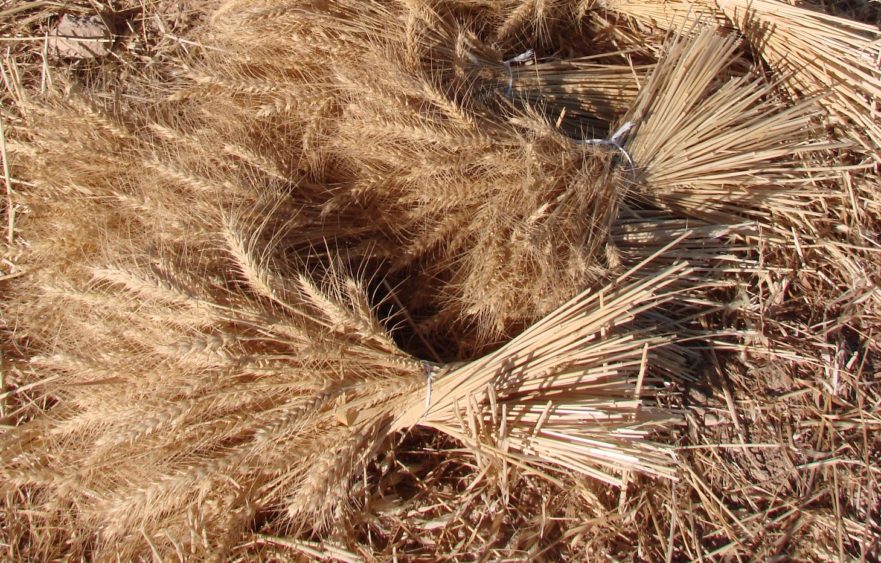Summary
When Jesus is asked to justify allowing his disciples to pluck and eat corn on a Sabbath, he appears to reply with an irrelevant story. If we assume that the Pharisees are complaining about the disciples performing labour on a Sabbath, it is irrelevant to answer them with the story about David feeding his men on the Bread of the Presence, because this story does not relate to performing any labour. Another problem lies in the fact that there are no rabbinic traditions which forbid performing the labour of preparing a handful of food on a Sabbath, and there are specific rulings which permit this amount of labour (though no more). These difficulties are eased in Matthew and Mark who append other comments by Jesus which appear to be more relevant, but this still leaves the problem that Jesus’ first reply appears to ignore the issue at hand.
A comparison of some old traditions within rabbinic legal collections indicates that the real issue was not Sabbath labour, but eating untithed food. Tithing could not be performed on a Sabbath, so freshly harvested food still contained the Heave Offering which only priests were allowed to eat. If this is the case, the story of David allowing his men to eat food only permitted to priests, would be an appropriate and irrefutable reply.
Premium Members and Friends of JP must be signed in to view this content.
If you are not a Premium Member or Friend, please consider registering. Prices start at $5/month if paid annually, with other options for monthly and quarterly and more: Sign Up For Premium
Premium Members and Friends of JP must be signed in to view this content.
If you are not a Premium Member or Friend, please consider registering. Prices start at $5/month if paid annually, with other options for monthly and quarterly and more: Sign Up For Premium
- [1] See details at www.T-R-E-N-T.com ↩
- [2] A third School tradition which might appear to be relevant is m. Maas. 4.2, but the context indicates that this concerns tithing for snacks performed after the Sabbath on food intended for the Sabbath. ↩
- [3] The concept of allowing incidental snacks without tithing was already regarded as an established ruling by the schools before 70 CE (m. Maas. 4.2 // t. Maas. 3.2) and by Johanan b. Zakkai and Eliezer b. Hyrcanus just after 70 CE (Yohanan b. Zakkai in t. Maas. 2.1 and Eliezer b. Hyrcanus in m. Maas. 2.4 // t. Maas. 2.2; m. Maas. 4.3). ↩
- [4] The tradition at m. Betz. 5.2 is difficult to date, but this principle is presupposed through the whole tractate, including the School disputes, so it must date back at least to the early first century. ↩
- [5] In Lev. 24:8 & 1 Chr. 9:32 the Bread of the Presence was to be changed every Sabbath, which is taken by Mishnah to imply that the previous week’s bread was divided and presumably eaten on a Sabbath—see m. Men. 11.7 cf. m. Suk. 5.7f. ↩
- [6] The actual penalty was extirpation, which originally meant that you were “cut off from Israel,” which by rabbinic times was understood to mean that God would visit you with an early death—cf. y. Bik. 2.1; b. MK. 28a. W. Horbury finds this concept in various early sources (Sib. Or. 3.259-61; Heb. 2:2 with Heb. 3:16f, 12:25; Heb. 10:28; Philo Spec. 2.253=46)—see “Extirpation and Excommunication,” Vetus Testamentum 35 (1985): 13-38, esp. p. 32. ↩
- [7] See m. Maas. 1.5; 2.4; and some later traditions at m. Ter. 9.7; m. Maas. 1.7; m. Hal. 3.1. ↩
- [8] This Shammaite opinion is related to the opinion of Eliezer b. Hyrcanus (m. Maas. 2.4), which may explain why the Jerusalem Talmud of this tractate considered Eliezer to be a Shammaite—cf. y. Betz. 1.4. ↩
- [9] See b. Sanh. 74a; y. Sanh. 3.6, 21b; y. Shebi. 4.2, 35a; t. Shab. 15.17. There were three traditional exceptions: idolatry, incest and murder, and according to b. AZ. 27b this was the text relied on by R. Ishmael when he said it was better that someone should die than to be healed in the name of Jesus (an example of idolatry). ↩
- [10] This saying is found only in Mark, but it is more likely that later it was removed by Matthew and Luke than that it was added by Mark. Luke and Matthew had a good reason to remove it because it implied that the following saying (“the Son of Man is lord of the Sabbath”) is non-dominical—i.e. ‘son of man’ in that saying parallels “man” in the preceding saying, so that it means ‘an ordinary man’ as it does normally in Biblical Hebrew and in first century Aramaic. A good summary of this usage is presented by Maurice Casey in Aramaic Sources of Mark’s Gospel, Society for New Testament studies monograph series; 102 (Cambridge: CUP, 1998), 111-121. The ‘dominical’ use (i.e. “Son of Man” as a title for Jesus) became the normal understanding of this phrase in the church, including in this saying. ↩
- [11] See for example m. Shab. 6.1-4. The traditions from before 70 C.E. are listed and analysed in my Traditions of the Rabbis vol. 2A (forthcoming). ↩



